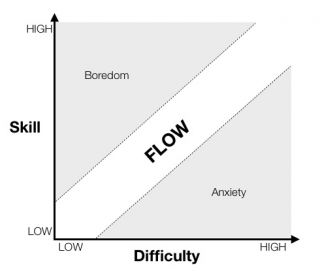What are Strengths?
Strengths are the traits or skills that you have that are considered positive. The definition of our character strengths is more specific: positive parts of our personality that impact how we think, feel and behave.
The great thing is that we all have strengths – they make us unique in how we approach things, in the interests that we have, the passion that we show, the energy that we feel.
Think about the difference in how you think, feel, act when you are doing something that uses your strengths versus something that doesn’t.
A strengths based approach can positively impact your performance, wellbeing and achievement potential – in life and at work.
Psychologist Mihály Csíkszentmihályi calls working within our strengths, working in a state of Flow.

Think about times at work or outside of work, when you have been really engaged and focused, really productive and found it enjoyable. When you were not easily distracted and completely immersed. This is a state of flow.
Where the challenge meets your skill set when using your strengths means you are motivated and engaged to perform at your best. Too much challenge for your skillset leads to feelings of anxiety. Too little challenge for your skillset leads to boredom.
This pivots away from the focus that some of us might have experienced in education or at work, where we are encouraged to focus on our weaknesses and what we need to improve on.
What I love about the strengths based approach is that it is a really simple approach and entirely available to every one of us. Your strengths will enable you to navigate challenges and achievements at work more effectively.
I made a big change to my own career path, my sense of happiness and fulfilment, my confidence and ultimately my quality of life by working out what my strengths were and focusing on what I could do differently with them.
What are the benefits of a strengths-based approach at work?
A strengths based approach has benefits for us as individuals, and also for the businesses we work for.
You can be:
- 8x more productive (Gallup)
- 6x more engaged in your job (Gallup)
- 3x more likely to report an excellent quality of life (Gallup)
- More: satisfied, stimulated, resilient, confident and creative
- Less: stressed, 15% less likely to quit
- Accelerated: growth & development
- Happier
- Find more meaning in your work
There is a growing body of research on how focusing on strengths improves employee health and wellbeing, and generates more value for the business. It focuses on how you can be at your best and gives a sense of empowerment in how you can overcome obstacles to achieve goals and maximise your own potential in a way that works for you – a way that you are naturally gifted in.
Watch Out
Strengths are on a continuum, and so in taking action to develop them to achieve peak performance, recognise that it is also about mitigating performance risks of overusing your strengths. Achieving peak performance requires a balanced approach.
You could apply the 80:20 rule here and think about spending 80% of your focus on developing your strengths and 20% on making sure you’re not going into overdrive and stop your strengths from getting in your way or becoming an energy drainer. So, for example, a strength of good decision making carries a performance risk of being too hasty in making decisions and not considering alternatives.
A strength of emotional control can carry a risk of coming across dispassionate or aloof.
A strength of empathy can lead to too much focus on the feelings of others and loss of your ability to offer objective support and guidance.
Also watch out – this is not about ignoring weaknesses completely, or about overstating competence. A balanced approach is best, with high self awareness of all: strengths, weaknesses and actual competence.
Where do you start?
Start by identifying your own strengths – ask yourself what you do well, what is easy and natural for you that others find harder? Also ask friends and family to get a broader perspective.
You can also take the free online survey by the VIA Institute on Character Strengths: https://www.viacharacter.org/. They have identified 24 character strengths which can be used to build individual strengths profiles. Knowing and applying your highest character strengths is the key to being your best self.
Strengths come up a lot in my coaching. Working with people who are feeling lost, stuck, dissatisfied with work or their career, strengths can play a critical role in opening up different ways of thinking and recognising what is there for us that we may not have seen so clearly before.
Identify your strengths, apply them and then build on them to improve your performance, wellbeing and achievement potential – in life and at work.